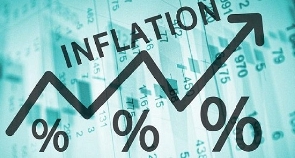Despite consumer inflation logging its biggest leap in nearly two decades, breaching the 50 percent threshold for an accelerated 18th consecutive month, market watchers have maintained the inflation outlook for a peak at the end of Q1 2023.
Headline inflation surged to 50.3 percent year on year (y/y) in November 2022 due to pass-through effects of the weaker cedi and rising petroleum prices, jumping from 40.4 percent y/y in October 2022 and currently sitting approximately 5x over the Bank of Ghana’s upper policy target of 10 percent. This makes it the highest increase in rate for a single month since January 2003 – when the rate shot up by 12 percentage points from 13.5 percent recorded in the previous month.
GCB Capital, in its analysis of November inflation, indicated that inflation will continue getting higher in December and January – albeit at a moderated pace.
“Regardless of the cedi’s sharp appreciation and the marked slowdown in ex-pump fuel prices, we expect inflation to continue higher through January 2023, albeit at a moderated pace. The anticipated downward price adjustment in response to the cedi’s resilience and easing fuel prices could be marginal. The Yuletide-induced demand pressures could also sustain the uptick in headline inflation,” it said.
In forecasting what to expect, the investment advisor said: “We anticipate a sharper cooling of inflation beyond 1Q 2023, as we believe we have seen the worst of cedi depreciation. With government committing to fiscal consolidation under an IMF programme from 2023, we expect the much-needed BoP support and policy credibility from the programme to anchor cedi stability through 2023”.
It is expected that the extended Covid-induced lockdown in China and the increasing threat of recession in major economies will continue to undermine oil demand. However, Chevron and other major oil producers resuming production in Venezuela following the US government lifting sanctions against the oil major will moderate the impact of supply shock from Russia, given the anticipated increase in oil supply.
“We believe cedi depreciation and rising petroleum prices are the primary triggers of inflation; and given this improved outlook for 2023, we expect a sharper cooling of inflation beyond 1Q 2023,” it said.
Commenting on the outlook, Constant Capital also maintained its outlook of higher inflation in Dec-2022 with a potential peak deferred to Q1-2023.
“In the near-term, we expect to see the impact of pass-through effects from cedi depreciation, elevated petroleum prices, upward transport fare adjustment, lagged impact of utility tariff hikes, as well as the yuletide-induced price increase and consumer demand to continue lifting the CPI,” it said.
While the exchange rate performance has seen a remarkable rally in recent sessions based on the Staff-Level Agreement (SLA) reached by government for an ECF programme with the IMF, we think the impact on ex-pump petroleum prices will be lagged markedly due to price-stickiness. Petroleum prices will respond relatively faster to the better FX performance and lower global crude oil prices, with lower ex-pump petroleum prices providing support for other sub-classes of inflation that depend on fuel – such as transport and food.
Money Market
On the money market, Constant Capital is of the view that demand will remain firm as investors take advantage of Treasury bill exemptions in the debt restructuring conversations. This provides opportunities for the Treasury to reduce its borrowing costs at the short window. “We expect to see relatively lower yields at the short end of the curve.”
Given the clarity on domestic debt restructuring, GCB Capital also expects domestic market sentiments to improve steadily and nominal yields to gradually correct across the curve. “Excess demand for T-bill has started to depress T-bill yields despite the pronounced negative real returns and the elevated inflation profile; T-bill yields could fall sharply once inflation peaks,” GCB Capital said.
“While inflation remains elevated, the anticipated risks to inflation appear to moderate in the near-term. Headline inflation is on course to peak in 1Q 2023, even though we expect further increases through January 2023. Thus, the monetary authorities could hold the policy rate at the Jan-23 meeting, as the balance of risk weighs heavily on growth,” it added.
Business News of Wednesday, 21 December 2022
Source: bftonline.com

















